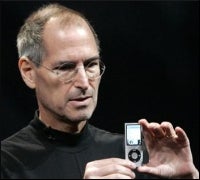 |
| Source: Reuters |
How big an impact will Apple’s Steve Jobs departure from day-to-day operations have on the company?
The most immediate effect has been on Apple’s (NASDAQ: AAPL) share price, which dropped seven percent in after-hours trading following Wednesday’s news that Jobs would be out until at least the end of June.
In an e-mail sent to Apple employees, Jobs, 53,
said he plans to “remain involved in major strategic decisions while I am out. Our board of directors fully supports this plan.”
An Apple spokesperson said the company had no comment beyond what was in Jobs’ e-mail.
Gartner analyst Van Baker said the impact of Jobs’ short-term departure (if indeed it is short-term) has been overblown in the blogosphere and other media. “I expect the stock price to take a hit, but I don’t think Apple’s success depends on whether Steve is there,” Baker told InternetNews.com.
“A lot more hinges on the economic climate than Steve’s health. People think Steve makes every decision, every day at Apple and without him things will fall apart, but I don’t see that impact. My suspicion is their product portfolio for this year is pretty well baked, it’s only a question of when to launch products,” Baker added.
Management consultant Marshall Goldsmith said he wouldn’t be surprised if Jobs plays a very big role at Apple during the next six months, even if he’s not there on a daily basis. “Apple is a product company that’s driven by innovation and technical genius,” said Goldsmith, author of the forthcoming book Succession: Are You Ready?. “He can still make a huge impact that is different than an operational CEO, which has never been his strength.”
But Goldsmith said today’s news is bound to have some negative impact.
“The company is in a Catch-22,” he told InternetNews.com. “They have helped create this image, rightly or wrongly, of an iconic leader that’s been given a huge amount of credit for the company’s success. If he’s not there, you can’t say it doesn’t matter, you can’t have it both ways.”
Apple fan Tony Bove has been using the company’s products for over twenty years and doesn’t plan to stop any time soon. “The sum of Apple is greater than its part,” said Bove, author of iPod & iTunes for Dummies. “Apple has great products, disciplined thinkers and developers. They’ve survived the trial by fire Steve is known for, so the ones still standing are good.”
The health issue
When Jobs finally opened up a bit about the state of his health recently, his comment that he suffered from a “hormone imbalance” was met with skepticism that his problems were deeper than that. Today’s e-mail confirmed he has bigger health issues.
“During the past week I have learned that my health-related issues are more complex than I originally thought,” he wrote.
Earlier today, CNBC tech reporter Jim Goldman said that two “extremely well known tech execs” close to Jobs told him they are deeply concerned about Jobs’ health. One of the execs told Goldman he believes Jobs is “in a state of denial” about his health.
While there is likely to be a lot of discussion about how forthcoming Jobs has been about his health and how much he told the Apple board, Goldsmith believes there’s an emotional component often overlooked.
“We all believe what we want to believe especially about our health. I think Jobs has consistently been telling us what he believes and hopes to be true, but sometimes those two can blur. That makes him human, not a liar,” he said.
Jobs survived a rare form of pancreatic cancer a few years ago after an operation. In recent months he’s looked noticeably gaunt, which Apple attributed to a change in diet and an exercise regimen as part of his recuperation process.
More concern about Jobs’ health surfaced late last month when Jobs decided to pass on giving his usual keynote address at the January Macworld conference.
In the e-mail explaining his reasons for taking a leave, Jobs emphasized the “distraction” media attention on his health has been to the company as well as his need to focus on recovery.


